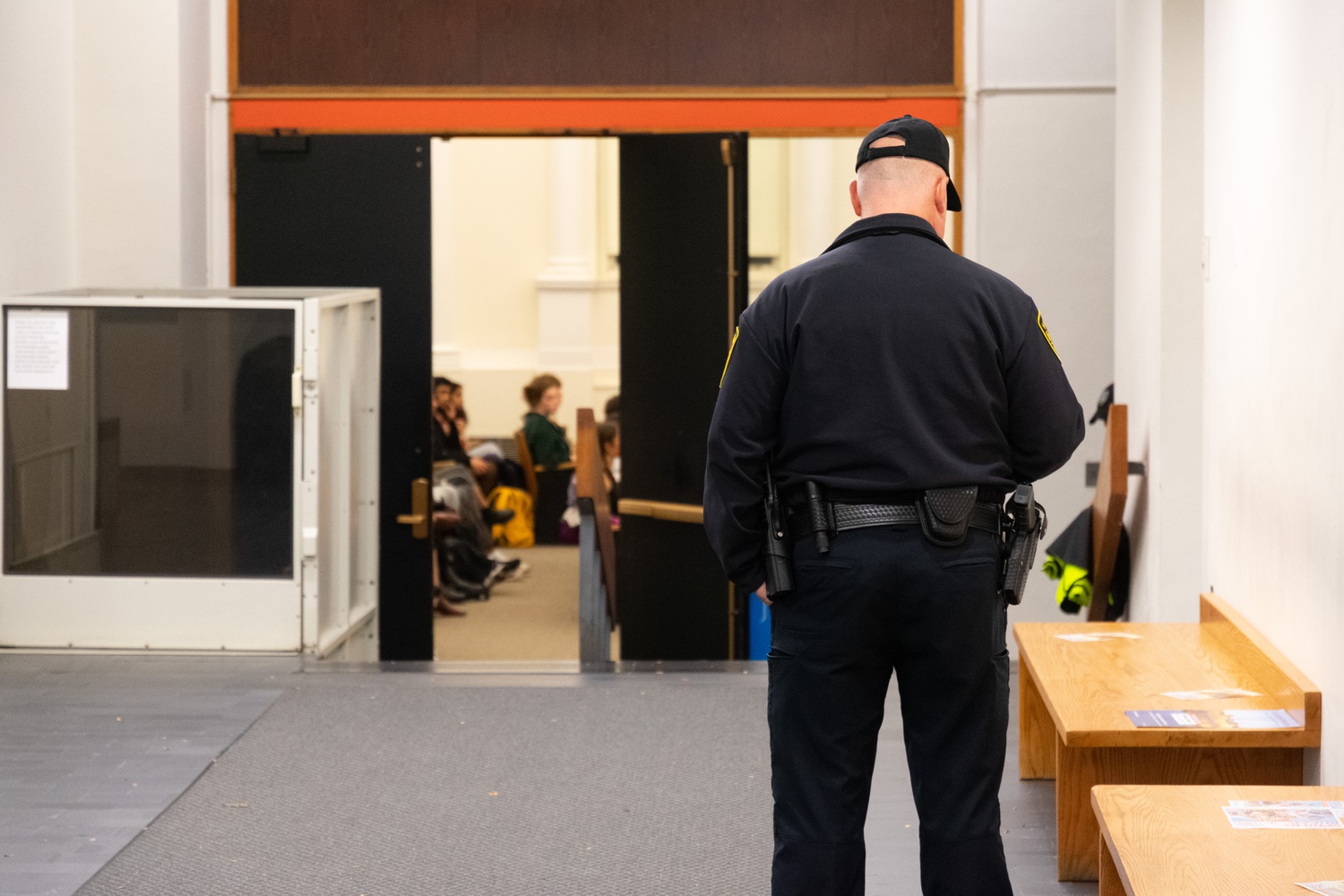
News
Harvard Grad Union Agrees To Bargain Without Ground Rules

News
Harvard Chabad Petitions to Change City Zoning Laws

News
Kestenbaum Files Opposition to Harvard’s Request for Documents

News
Harvard Agrees to a 1-Year $6 Million PILOT Agreement With the City of Cambridge

News
HUA Election Will Feature No Referenda or Survey Questions
Student Groups Host Event with Palestinian Activist Mohammed El-Kurd, Drawing Protest from Pro-Israel Students

Harvard student organizations hosted a Monday discussion on divestment and youth activism with Black Lives Matter organizer Marcus McDonald and Palestinian writer Mohammed El-Kurd — who drew protest from some pro-Israel students who criticized his rhetoric as antisemitic.
More than 170 Harvard affiliates attended the talk, entitled “Confronting State Violence,” which was co-hosted by student groups including the Palestine Solidarity Committee and the Harvard Prison Divestment Campaign. As attendees entered Emerson Hall for the event, more than 30 protesters displayed Israel’s flag and waved posters criticizing El-Kurd.
Shortly after the event began, the protesters entered the lecture hall and held signs in the back of the room.
During Monday’s talk, El-Kurd described his experience with “violence that is systematically, institutionally sponsored.” El-Kurd grew up in Sheikh Jarrah, a neighborhood in East Jerusalem.
“In our rage to seeing policemen and soldiers raid our homes, we have been called all kinds of things, and we have been accused of all kinds of bigotries,” he said. “But that goes to show you that those who dare resist colonial violence, those who dare resist state violence will be met with disinformation, will be met with protests, will be met with baseless accusations.”
El-Kurd, a 24-year-old activist and outspoken critic of Israel’s occupation of Palestine, has drawn criticism from pro-Israel organizations like the Anti-Defamation League and campus groups like Harvard Hillel and the Harvard Israel Initiative for rhetoric they deem antisemitic.
At Monday’s event, El-Kurd criticized the media’s depiction of Palestinian activists, saying they are labeled in the “binary of tropes of either a terrorist or a victim.”
McDonald discussed his activism against racism and white supremacy as the lead organizer of the Charleston Black Lives Matter chapter.
“Specifically state-sanctioned violence is something we’ve seen since we got here,” McDonald said. “If you look at the history, you can see that it’s rooted in white supremacy, it’s rooted in race-based violence.”
Harvard Hillel president Natalie L. Kahn ’23, who helped to organize the protest of the event, said while she believes “dialogue is very important,” El-Kurd’s rhetoric has “crossed the line.”
“The kind of ideology that the PSC is espousing, when that’s the kind of speaker that they’re inviting in — they can’t claim to be for peace and dialogue or for really any kind of conflict resolution,” said Kahn, a Crimson News editor.

Rabbi Jonah C. Steinberg, executive director of Harvard Hillel, wrote an email to Hillel members Monday morning denouncing El-Kurd’s invitation to speak on campus.
In response to criticisms of the event and speaker, PSC organizer Joshua D. Willcox ’23-’24 said PSC “condemns all forms of discrimination, antisemitism included.”
Protester Shira Z. Hoffer ’25 said while she feels El-Kurd’s “rhetoric often slips from anti-Israel, anti-Zionist sentiment into antisemitism,” she supports his invitation to campus as a means to strengthen academic discourse.
Still, Ph.D. student J.J. Kimche, who also protested, said he had hoped the event would be “blocked” by the administration.
A Harvard College spokesperson wrote that “freedom of expression is essential to a liberal arts and sciences education” in a statement to The Crimson following the protest.

During the event, El-Kurd advised young activists to “remember that liberation requires sacrifices,” citing the backlash he has received.
“People protesting my advocacy, people smearing my name, spreading disinformation about me, could not move a hair on my body,” El-Kurd said during the event. “It’s not because I’m strong, and it’s not because I’m powerful, but because when you put it in perspective, what’s a bunch of whiny Ivy League kids going to do to me?”
Willcox said focusing on the protest rather than on the event’s cause “only contributes to decentering the narrative completely and shifting focus away from the discourse that can be productive.”
“After someone has spoken about state violence, about ethnic cleansing and the liberation of Black people in this country, and Palestinians, and the only form of interaction that [The Crimson] wants to be written about is the form of backlash — it just ultimately speaks volumes about the reduction of the issue to this one narrative,” Willcox said.
Asmer A. Safi ’23-’24, an organizer for PSC, praised the event for drawing attention to the cause of divestment and “bringing in people from all different walks of life.”
“That’s something that shows the changing of narratives that’s taking place on campus by virtue of the turnouts that we keep getting, and turnouts that keep increasing all the time,” Safi said. “People understand that there’s more to the cause than just the blatant attacks that we get each time.”
—Staff writer Vivi E. Lu can be reached at vivi.lu@thecrimson.com. Follow her on Twitter @vivielu_.
—Staff writer Leah J. Teichholtz can be reached at leah.teichholtz@thecrimson.com. Follow her on Twitter @LeahTeichholtz.
Want to keep up with breaking news? Subscribe to our email newsletter.
